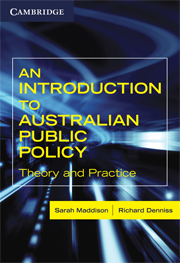Book contents
- Frontmatter
- Contents
- List of figures
- List of tables
- List of case studies exercises, and original contributions
- Foreword
- PART 1 Policy and theory
- Introduction
- 1 The australian policy context
- 2 State or market I: Ideology and public policy
- 3 State or market II: The economics of public policy
- 4 Models and theory for understanding policy
- 5 Policy actors and policy instruments
- 6 Identifying issues: Agenda setting and policy discourse
- PART 2 Policy in practice
- References
- Index
- References
5 - Policy actors and policy instruments
- Frontmatter
- Contents
- List of figures
- List of tables
- List of case studies exercises, and original contributions
- Foreword
- PART 1 Policy and theory
- Introduction
- 1 The australian policy context
- 2 State or market I: Ideology and public policy
- 3 State or market II: The economics of public policy
- 4 Models and theory for understanding policy
- 5 Policy actors and policy instruments
- 6 Identifying issues: Agenda setting and policy discourse
- PART 2 Policy in practice
- References
- Index
- References
Summary
The policy process is initiated, researched, refined, driven and implemented by individuals. While the policy cycle outlined in Chapter 4 provides an overview of the process of new policy formulation, this view of the policy process underemphasises the role that individuals play, either on behalf of themselves or on behalf of an organisation, and it therefore overlooks the importance of both the motives and constraints of those individuals. Policy is in fact made through a set of complex interactions between state and non-state actors. Institutions and processes also play an important role in creating the sorts of policy sub-systems (Howlett & Ramesh 2003: 53) within which individuals have the potential to drive, delay, prevent or modify the passage of a policy from idea to implementation.
This chapter begins by outlining the key actors in the policy process and the web of relationships between them, which are understood variably as policy communities and policy networks. The chapter will conclude with a discussion of the wide range of policy instruments available to policy makers, discussing the fact that different policy actors may have different degrees of access to different policy instruments. This suggests that at times the choice of instrument is a function of the sort of policy that actors, or a coalition of actors, is seeking to change.
Policy is ‘made’, ‘shaped’ and operationalised by a large number of individuals often referred to as policy actors.
- Type
- Chapter
- Information
- An Introduction to Australian Public PolicyTheory and Practice, pp. 102 - 123Publisher: Cambridge University PressPrint publication year: 2009



